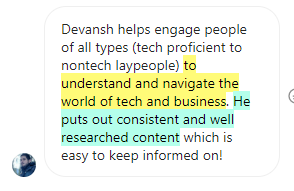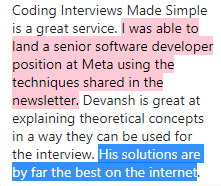The Big Tech War has started. Here is how you will win [Finance Fridays]
I've been hinting at this for a while. Get ready for a wild one
To learn more about the newsletter, check our detailed About Page + FAQs
To help me understand you better, please fill out this anonymous, 2-min survey. If you liked this post, make sure you hit the heart icon in this email.
Recommend this publication to Substack over here
The Big Tech War,
I’ve talked about it extensively on my channel and Machine Learning Breakdowns,
A lot of you have asked for more details.
Well, here it is. And believe it, it will be worth the wait.
Let’s dive right into it. If you’re looking to make money in tech, this post is for you.
Key Highlights
What is the Big Tech War- The big tech companies have all become the kings of their niche. To make money, they have to expand into other areas, which has their own king. These companies are spending top-dollar (in billions) to gain some ground.
Some Examples of this- Amazon bought Roomba for 1.7B to help them gain a new market and improve their presence in the domestic products space. Machine Learning engineers at Meta released competition to Google, by open sourcing their Large Language Model called Sphere (which I broke down here). Facebook (and earlier MS)has invested a lot into Facebook Gaming as a competitor to Twitch. Google also got into this space through Stadia. The examples go on and on.
Why this is relevant to you- Where there is money being thrown around, there is money for you to make. If you can establish yourself as a top-tier professional in your field, these organizations will pay you a ton.
The 3 Personas- There are 3 different paths you can use to make money in this war. They are the i) employee, ii) consultant, iii) entrepreneur. We’ll cover these and how the first two can make money in-depth. The third is extremely complex and needs a separate piece dedicated to it.
I hope you’re excited about this. By the end, you will have a clear idea of your next steps and your earning potential is going to go through the roof.

The Big Tech War
I want you to imagine a nice and fertile plain with tons of tribes. Eventually a few of these tribes start expanding, and soon this plain has been split into different kingdoms. The Search Kingdom is run by Google tribe. The vicious Amazon tribe has expanded to become the kings of the ECommerce Kingdom. etc etc. All the big tribes are dancing around, pointing their sticks, and eventually acquiring smaller tribes around their kingdoms/in new lands. This goes on for a bit, and so far all are happy.
Eventually, the plains run out. The best parts of the plain have now been colonized by the big (tech) tribes. To really have the most profitable lands, they now have to take over lands ruled by other major tribes. So all the major tribes gear up for war. However, since their opponents are now other major tribes, the resources and scale required in their wars are much higher, and the victories are much smaller. Millions are thrown around to gain inches.
This is the state of the Tech Industry. Lots of companies are fighting against lots of other companies to gain market share. Amazon, Google, and MS are all fighting over the cloud. Amazon (Prime), Google (YouTube), Meta(Facebook, IG), and Netflix are all going ham trying to gain your attention. Etc etc. There is a lot of money going around and hundreds of billions are being spent to gain the slightest advantages. If you’re a soldier, then your skills are in very heavy demand.

What this means for you
Companies are putting a lot of resources into gaining the slightest advantages. The most obvious example of this is in the very compensations + Perks that all the Big Tech has become famous for. But this is not the only way that companies invest to gain advantages.
Those that work in Machine Learning will know about Libraries like Tensorflow and Pytorch. TF was created by Google and Torch by Meta. Recently, Amazon released a library for causal inference. All these take a lot of time and money to develop. So why did they give this out for free? Why are companies investing so many resources just to open-source their technologies? Hint: It’s not the goodness of their hearts.
By opening up their libraries these firms gain a lot of developer feedback and free debugging. Programmers also become more familiar with the tech stacks, which makes training new devs much cheaper. It can also be used to undermine the competition, like how PyTorch beat Tensorflow and now has Google betting on JAX. Or how Meta recently completely open-sourced OPT, a 175-Billion Parameter model that challenges Microsoft’s GPT-3 (read my breakdown of that here). These are all ways that companies invest to gain advantages in this war.
The other non-obvious way that companies invest is through spending a lot on acquisitions and investing in new avenues. If you can be at the right place at the right time, then this can be your golden ticket. With the background out of the way, let’s cover the 3 personas that you can use to make your money in this tech war.
The 3 Personas
Broadly speaking, you can perform 3 different kinds of roles to come out on top. Each has its own pros and cons-
The Employee- This is what most people think when they think of making money in this war. Get a nice high-paying job, and cash in. Nothing wrong with this. However, this will come with a capped earning potential and you will not have as much autonomy. This is also the lowest risk option, with the clearest and most straightforward way forward.
The consultant- Offer your expertise to firms/organizations for very specific problems. This is a step up from the employee when it comes to having more autonomy and flexibility. You’ll also have a higher potential earning here. However, you will typically not have any benefits and it is much riskier than the employer.
The entrepreneur- This is in many ways the Silicon Valley Dream. Create a startup, and run it long enough to either go public or be bought by a bigger company and make millions. This requires a lot of luck, expertise, and networking. The highest risk, but the highest potential upside.
These aren’t hard and fast boundaries, but closer to guidelines. Your life and career will have shades of all these roles. I’m just differentiating between these to make clear to understand.
The Employee
To thrive as an employee, you need 2 things- the skill to actually get into these places and the ability to stay there and make money. Contrary to popular belief, your job is not secure in big tech firms. These firms have very high expectations and ruthless lay-off employees that aren’t performing very well. Many engineers feel burnt out because of the demanding schedule leading to very short tenures in these roles.
You also face a lot of indirect risks. You’re at the mercy of upper management and other decision-makers. You might be laid off through no fault of your own and you will typically not have a lot of negotiation power (especially against big firms). However, these aren’t as scary as you would originally think. In case of layoffs, you will be able to find other jobs.
If you’re a good employee, you will mostly be fine. Keep your emergency fund stocked, and continue to build your expertise in your chosen domain. You should also have a foundational understanding of the tech industry, finance, and economics to protect yourself from falling for the hype and losing your money by investing in bubbles or by working in a company with weak fundamentals. And your life will be extremely groovy.

As long as you have the basics of personal finance, communication and logic down, you can focus on improving your domain-related expertise. If you’re a developer spend time learning about different topics, concepts, and engineering blogs to see how problems were solved by other people. Show up to all the Math Mondays, Technique Tuesdays, Thursdays, and System Design Sundays in this newsletter. They will be your best friends. The other days will help, but their utility will vary based on the topics.
This is ideal for you if you like your field and don’t want to diverge too much from it. You also don’t need to network as aggressively, which can be very appealing to people that like to keep to themselves.
Overall, being an employee is a perfectly valid lifestyle for most people. Great employees will be compensated well, don’t need to worry about too many things and can really focus on the job at hand.
If you have a lot of faith in your skills, higher risk tolerance, and value cash in hand more than perks, here is a great tip- look for work in startups. Startups can’t really compete with well-established companies on perks and prestige. So they have a much higher base pay, especially for senior engineers. This is how startups try to attract the best talent to work for them.
This is a riskier move (especially since most startups go bust), but can be great for your career. Aside from the pay, startups can be a great learning experience, and getting to a senior engineering position is much easier. Thus they can be great for building your career. However, they will require a lot of work.
The Consultant
A consultant is kind of the midway point between the employee and the entrepreneur. You work with different people to solve specific problems. For example, I will be giving a talk to a senior analytics team at LinkedIn about a Machine Learning solution that I built to quantify the uncertainty of ML model predictions when your input data itself is very unreliable. This system integrates active learning and concepts like dispersion to create confidence scores for samples and predictions. The team at LinkedIn is facing very similar issues and has reached out to me for help. If any of you are interested in learning more, let me know and I will break the system down in depth.
There are 2 amazing benefits of playing the consultant. You get to set your own timings/schedule and you get paid a lot. I have been offered contracts ranging from USD 500-750 per hour for my consulting. What’s the catch? You don’t get things like Health Insurance (which can be huge). You also don’t have guaranteed work. An employee has fixed hours and can plan finances easily. As a consultant, you won’t have any promises about work and pay, and you might go weeks without being called upon.

To avoid this, you will need to network very strongly. This is important early, as you build a profile. Once you’re established, people will come to you. Till then, you have to bring the party to people. Should you choose to go this route, I would suggest having a job in the beginning. Use that to pay the bills as you build up your presence. And eventually, you will have enough of a network.
In terms of requirements, you’ll need to be good at making connections between various ideas. Aside from the technical aspects of your work, you will also need to know about the field in general so that you can find the best value adds. How are people in related aspects solving challenges? How can their solutions be used in this new context? While this is true for even employees, this is a critical skill for consultants. As a consultant, you will need to sell yourself and your services and make them relevant to your targets. You will need to work on a lot more than just your technical skills. You will also need to work on your ability to sell yourself and think on your feet. Understanding how different industries and domains work will be a huge plus.
If you’re interested in this route, don’t miss out on the Finance Fridays and Storytime Saturdays. Both these will give you a lot of insight into the sector that will allow you to marry your technical skills with business insight to create the most value. This goes without saying, but a strong theoretical base is a must.
Consultants also need a much stronger network of sources that they learn from. This will allow them to spot trends and identify the best value adds. I also suggest getting into writing/or some kind of content creation to act as a way to demonstrate their value to potential clients and allow people to find them. This requires both technical and non-technical skills.
In a nutshell, To be a great consultant you need to go above and beyond what good employees need. This is the price you pay for your the added pay and flexibility. If you have the time, energy and circumstances that allow you to go down this route, then this might be great. Getting things going requires a lot, but if it works out, it will pay off big.
We’ll end this email here. As promised, the entrepreneur persona will be covered in another post. That requires a dedicated post to it. We’ll do that soon.
I created Coding Interviews Made Simple using new techniques discovered through tutoring multiple people into top tech firms. The newsletter is designed to help you succeed, saving you from hours wasted on the Leetcode grind. I have a 100% satisfaction policy, so you can try it out at no risk to you. You can read the FAQs and find out more here. You can scroll below to get 20% off for upto a whole year.
If you have enjoyed this post so far, please make sure you like it (the little heart button in the email/post). I also have a special request for you.
***Special Request***
This newsletter has received a lot of love. If you haven’t already, I would really appreciate it if you could take 5 seconds to let Substack know that they should feature this publication on their pages. This will allow more people to see the newsletter.
There is a simple form in Substack that you can fill up for it. Here it is. Thank you.
https://docs.google.com/forms/d/e/1FAIpQLScs-yyToUvWUXIUuIfxz17dmZfzpNp5g7Gw7JUgzbFEhSxsvw/viewform
To get your Substack URL, follow the following steps-
Open - https://substack.com/
If you haven’t already, log in with your email.
In the top right corner, you will see your icon. Click on it. You will see the drop-down. Click on your name/profile. That will show you the link.
You will be redirected to your URL. Please put that in to the survey. Appreciate your help.
In the comments below, share what topic you want to focus on next. I’d be interested in learning and will cover them. To learn more about the newsletter, check our detailed About Page + FAQs
If you liked this post, make sure you fill out this survey. It’s anonymous and will take 2 minutes of your time. It will help me understand you better, allowing for better content.
https://forms.gle/XfTXSjnC8W2wR9qT9
I’ll see you living the dream.
Go kill all and Stay Woke,
Devansh <3
To make sure you get the most out of Finance Fridays, make sure you’re checking in the rest of the days as well. Leverage all the techniques I have discovered through my successful tutoring to easily succeed in your interviews and save your time and energy by joining the premium subscribers down below. Get a discount (for a whole year) using the button below
Reach out to me on:
Instagram: https://www.instagram.com/iseethings404/
Message me on Twitter: https://twitter.com/Machine01776819
My LinkedIn: https://www.linkedin.com/in/devansh-devansh-516004168/
My content:
Read my articles: https://rb.gy/zn1aiu
My YouTube: https://rb.gy/88iwdd
Get a free stock on Robinhood. No risk to you, so not using the link is losing free money: https://join.robinhood.com/fnud75






"Quantifying the uncertainty of ML model predictions when your input data itself is very unreliable. " Would like to know more about it. Can you give a break up of this.